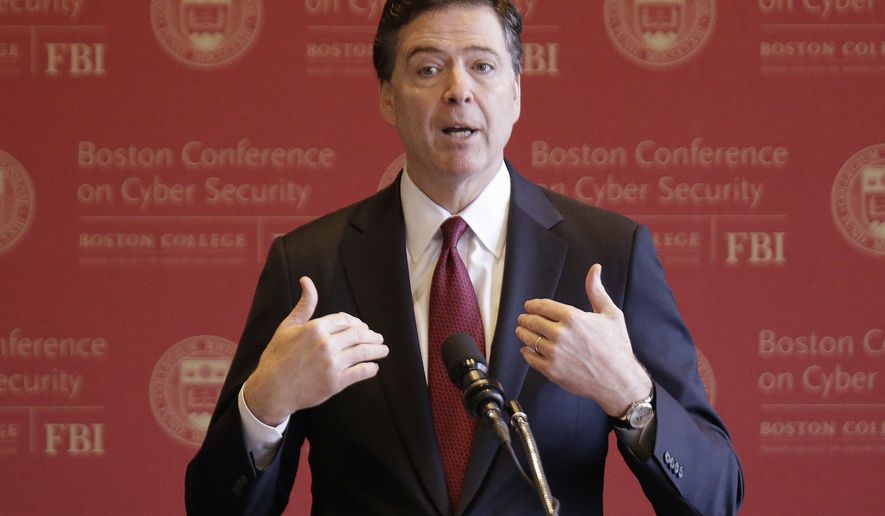FBI Director James Comey on Wednesday indicated he has no plans to step down from his post before the end of his 10-year term, despite finding himself at the center of one political controversy after another during the course of the past few months.
“You’re stuck with me another 6½ years,” the FBI director said as he gave remarks at a cybersecurity conference at Boston University.
Mr. Comey didn’t address the controversies that have dogged him over the last several months, including his disclosure two weeks before the the presidential election that the FBI was renewing its investigation into Hillary Clinton’s private email server or more recently his reported request that the Justice Department refute President Trump’s unsubstantiated claims that President Obama had wiretapped his phones during the campaign.
Rather, Mr. Comey spoke about the FBI’s efforts to combat cybersecurity threats, highlighting the threat he said default encryption poses as well as the need to develop better relationships with private companies before they become victims of cyber attacks.
While Americans have a reasonable expectation of privacy in their everyday lives, Mr. Comey noted the government’s authority to “invade our private spaces” with the court approval.
“There is no such thing as absolute privacy in America. There is no place in America outside of judicial reach,” he said.
But the widespread manufacture and sale of cellphones and other devices that offer encryption as a default option changes that, he said.
“Encryption has become the default, no longer just the province of the sophisticated actor,” Mr. Comey said of the change noticeable since NSA leaker Edward Snowden’s disclosed information about U.S. surveillance capabilities in 2013. “Because it is sold on devices and available through a huge number of apps, it becomes a feature of the work of the less sophisticated — of drug dealers, or armed robbers, of terrorists, of pedophiles, of bad people of all sorts.”
From October through December 2016, Mr. Comey said out of 2,800 devices the FBI received from local law enforcement and had legal authority to gain access to, the bureau was unable to open 1,200 devices.
Another area where Mr. Comey said the FBI is working to improve is in building relationships with private companies so that companies feel comfortable coming to the bureau when they become the victim of a cyber intrusion.
Mr. Comey said when companies are the victim of hacks or targeted with ransomware, some have opted not to share information with the FBI out of fear of what the bureau would do with the private data on their employees and operations.
“We will protect your privacy,” Mr. Comey said. “We will not share data about your employees and your operations and we will have an adult conversation at the beginning to explain ’Here is what we will do with the information you give us,’ so you as a general counsel, a chief security officer, a CEO can make a judgment about the risks and benefits.”
But in the same way companies may talk with local police or fire departments to about the layout of their buildings or other infrastructure so they are prepared to respond to a crisis, Mr. Comey suggested companies have similar discussions with local FBI officials to be better prepared in the case of a cyber intrusion.
“Maybe after that adult conversation you decide you know what, I don’t want to cooperate,” Mr. Comey said. “But I think its highly likely once you understand how we operate that you will.”
In hacking attacks, Mr. Comey also emphasized that companies should not try to retaliate against those believed responsible.
“Don’t do it. It’s a crime,” Mr. Comey said.
• Andrea Noble can be reached at anoble@washingtontimes.com.




Please read our comment policy before commenting.